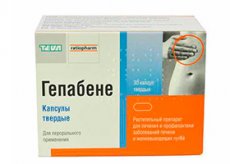Medical expert of the article
New publications
Preparations
Hepabene
Last reviewed: 04.07.2025

All iLive content is medically reviewed or fact checked to ensure as much factual accuracy as possible.
We have strict sourcing guidelines and only link to reputable media sites, academic research institutions and, whenever possible, medically peer reviewed studies. Note that the numbers in parentheses ([1], [2], etc.) are clickable links to these studies.
If you feel that any of our content is inaccurate, out-of-date, or otherwise questionable, please select it and press Ctrl + Enter.

Indications Hepabene
It is used for the following diseases:
- having a chronic form of toxic disease affecting the liver;
- chronic hepatitis;
- dysfunction of the biliary tract (this includes conditions that develop as a result of the cholecystectomy procedure ), in combination with other medications used for such disorders.
 [ 3 ]
[ 3 ]
Release form
The therapeutic drug is released in capsules, 30 pieces per pack.
Pharmacodynamics
Gepabene is a complex herbal medicine that includes extracts made from milk thistle and wild rue, whose properties provide its therapeutic effect. The drug is used to stabilize liver function in various pathologies.
Wild rue, which contains fumarin alkaloid, helps to stabilize the amount of bile secreted, thereby facilitating its flow into the intestinal area, and also eliminates spasms of the gallbladder and bile ducts.
Silymarin, which is a component of milk thistle, has a hepatoprotective effect, developing in the case of liver poisoning, which has an acute or chronic form (synthesizing toxic elements with free radicals inside the liver tissue). In addition, it stimulates protein binding processes, has an antioxidant and membrane-stabilizing effect, and also helps restore damaged liver cells.
Pharmacokinetics
After oral administration, silymarin flavonoids undergo recirculation processes in the intestinal and hepatic regions. Excretion occurs mainly with bile.
Dosing and administration
The therapeutic cycle scheme is selected for each patient individually. The capsules should be taken with food, without crushing or chewing them (swallow with plain water).
Usually, 3 capsules are required per day (at approximately equal time intervals). If pain occurs at night, an additional capsule may be taken before bedtime. The daily dose may be increased to 6 pieces (this dosage is maximum), which are taken 3-4 times per day.
 [ 4 ]
[ 4 ]
Use Hepabene during pregnancy
The question of using the medication during lactation or pregnancy should be decided by the patient's attending physician.
Contraindications
Among the contraindications:
- the presence of intolerance to the components of the capsules;
- acute diseases affecting the liver and biliary tract (in the acute stage).
Side effects Hepabene
Sometimes taking capsules leads to increased diuresis, various allergy symptoms and a laxative effect.
Overdose
There is currently no information on poisoning with Gepabene. If a patient accidentally takes too many capsules, they should consult their doctor.
Storage conditions
Shelf life
Gepabene can be used for a period of 5 years from the date of manufacture of the pharmaceutical product.
Application for children
Gepabene is prohibited for use in pediatrics.
 [ 6 ]
[ 6 ]
Analogues
The following substances are analogs of the drug: Allochol, Convaflavin, Holosas with Flamin, Cholagol with Tsikvalon, and in addition, artichoke extract, Olimetin, Choleretic collection No. 3, Hofitol with Leptandra Compositum, Liobil with Odeston, Kavehol, tansy flowers and Fitogepatol.
Reviews
Gepabene usually receives good reviews from medical professionals – it demonstrates high efficiency in pain associated with the gallbladder and liver.
Comments left on medical forums by patients who have used the medication in combination with other means used in such cases are almost always positive. Only occasionally is the development of negative symptoms noted (pain or a feeling of heaviness in the right hypochondrium, diarrhea and a feeling of weakness), which is not considered a serious drawback of the medication.
Attention!
To simplify the perception of information, this instruction for use of the drug "Hepabene" translated and presented in a special form on the basis of the official instructions for medical use of the drug. Before use read the annotation that came directly to medicines.
Description provided for informational purposes and is not a guide to self-healing. The need for this drug, the purpose of the treatment regimen, methods and dose of the drug is determined solely by the attending physician. Self-medication is dangerous for your health.

